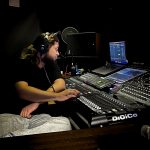 Produced by Guest blogger
Produced by Guest blogger
This is a guest blog by Susan L. Edser, MA Creative Writing and Publishing student at BU.
‘No one cares what you went through,’ the internationally renowned filmmaker Imruh Bakari says. ‘All that matters is what is on the screen.’
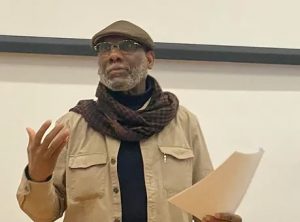
I have been on a crash course in filmmaking over the last few months, and this is one of Imruh’s key messages at the film showcase.
I realised he is right. When I watch a film, I don’t know the difficulties on set or the budget cuts mid-shoot; I just know what is in front of me and whether I like it.
In February 2024, I attended the first workshop with students, academics, and researchers for the Allies in Action research project. This multi-media collaboration drew on the African ‘Ubuntu’ concept to promote fellowship across diversity. The students ranged in cultures, ethnicities, sexualities, abilities, and ideologies. The aim was to explore intersectionality and how empathy can be built by understanding different subject positions. We would do this by producing short films, and the academics and researchers would support and analyse the process.
We were allocated groups, and from that first night to the showcase in May 2024, we made four films. That’s the short version, and according to Imruh, that’s all that matters. So, I won’t tell you about the tentative beginnings, as I got to know the others in Team 3 but was acutely aware of our differences. I won’t mention the difficulties securing a location during the Easter holiday when everywhere seemed shut. I’ll skip over the panic when one of our team members pulled out the day before filming. And let’s not even go there about the parking fine. I will tell you that I met three people I would never have met otherwise and how we were willing to open up, share, and learn about our differences. We found a commonality and came up with an idea. I wrote the script, and each week, we reworked it to make it better.
‘I’d never say that,’ one of them told me, commenting on my attempt to write dialogue for her, a woman 35 years younger than me.
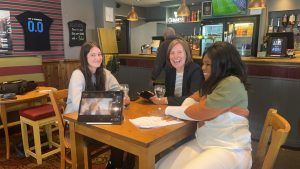
Another hand wrote how she would talk, as her Nigerian dialect differed from my British way of speaking. We listened, respected each other, and laughed. A lot.
Two days of filming followed, and the director brought friends to assist him and others to be extras. I was so impressed that they would give up so much of their time and knowledge to help us make our film. This was an open-heartedness I hadn’t expected.
The film Dream Team explored strength through diversity. Three women were thrown together by chance and succeeded in a pub quiz because of their differences. Our experience mirrored the film, as our individual strengths shone during difficult times, working together to solve problems. One person showed tenacity in securing a location, another bravery in sharing their honest opinion, and someone else demonstrated creativity on the film set. I valued myself and the process by standing by my script when someone outside the group rewrote it.
Imruh was partly right. The trials that came with making this film don’t matter, as the audience will never know. I believe, though, the film is better because of those difficulties. We each had different motivations, but the film mattered to us, and we were determined to make it happen. I participated in the Allies in Action research project because I thought learning scriptwriting and filmmaking would be a unique experience. I had no idea I would make three new friends, too. And along the way, I gained something else: empathy.
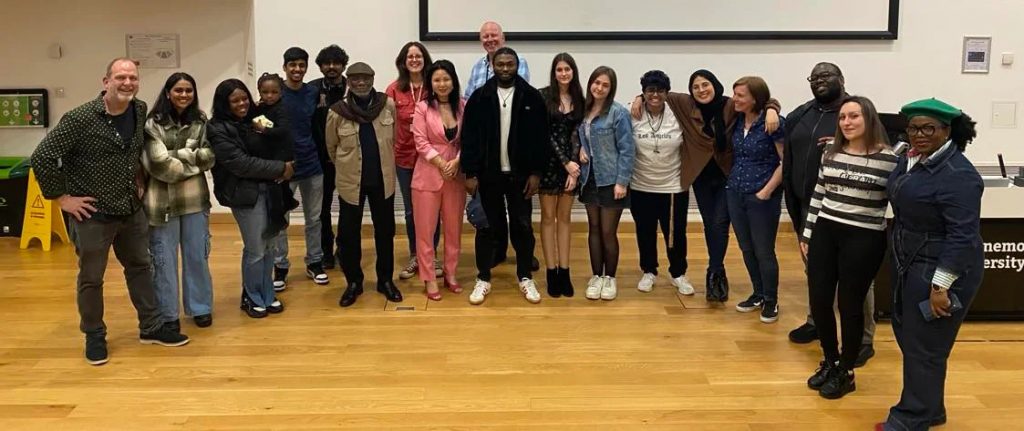
 Why I Chose Creative Writing and Publishing for my Masters
Why I Chose Creative Writing and Publishing for my Masters Zoey’s Experience Interning with The Tandem Collective
Zoey’s Experience Interning with The Tandem Collective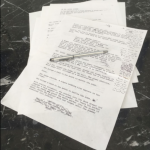 Why I chose to do a Master’s
Why I chose to do a Master’s My scholarship story: Changing my life
My scholarship story: Changing my life








